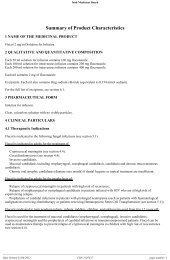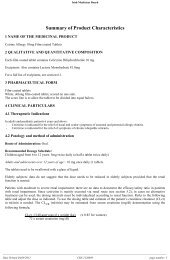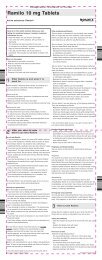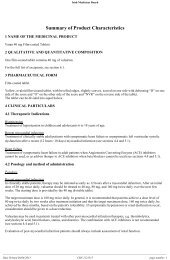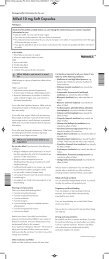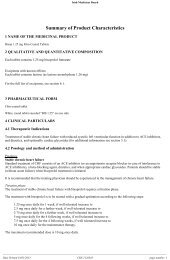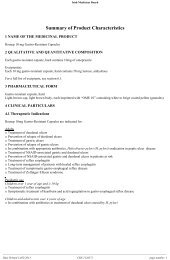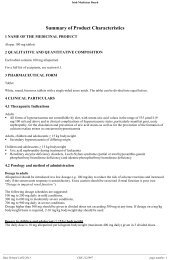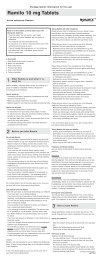Pendrex 2 & 4mg Tablets - Rowex Ltd
Pendrex 2 & 4mg Tablets - Rowex Ltd
Pendrex 2 & 4mg Tablets - Rowex Ltd
Create successful ePaper yourself
Turn your PDF publications into a flip-book with our unique Google optimized e-Paper software.
<strong>Pendrex</strong> 2 & <strong>4mg</strong> <strong>Tablets</strong> PIL **VAR 23** 09-12_148x630mm 06/12/2012 10:08 Page 1<br />
perindopril tert-butylamine<br />
Package leaflet: Information for the user<br />
<strong>Pendrex</strong> 2 mg <strong>Tablets</strong><br />
<strong>Pendrex</strong> 4 mg <strong>Tablets</strong><br />
Read all of this leaflet carefully before you start taking this medicine.<br />
•Keep this leaflet. You may need to read it again.<br />
• If you have any further questions, please ask your doctor or pharmacist.<br />
• This medicine has been prescribed for you. Do not pass it on to others. It may harm them, even if<br />
their symptoms are the same as yours.<br />
• If any of the side effects gets serious, or if you notice any side effects not listed in this leaflet,<br />
please tell your doctor or your pharmacist.<br />
In this leaflet:<br />
1. What <strong>Pendrex</strong> is and what it is used for<br />
2. Before you take <strong>Pendrex</strong><br />
3. How to take <strong>Pendrex</strong><br />
4. Possible side effects<br />
5. How to store <strong>Pendrex</strong><br />
6. Further information<br />
1<br />
2<br />
What <strong>Pendrex</strong> is and what it<br />
is used for<br />
Perindopril belongs to a class of medicines called<br />
ACE inhibitors. These work by widening the<br />
blood vessels, which makes it easier for your<br />
heart to pump blood through them.<br />
<strong>Pendrex</strong> tablets are used:<br />
• to treat high blood pressure<br />
(hypertension)<br />
• to treat heart failure (a condition where<br />
the heart is unable to pump enough<br />
blood to meet the body’s needs);<br />
• to reduce the risk of cardiac events, such<br />
as heart attack, in patients with stable<br />
coronary artery disease (a condition<br />
where the blood supply to the heart is<br />
reduced or blocked) and who have<br />
already had a heart attack and/or an<br />
operation to improve the blood supply to<br />
the heart by widening the vessels that<br />
supply it.<br />
Before you take <strong>Pendrex</strong><br />
Do not take <strong>Pendrex</strong><br />
• if you are allergic (hypersensitive) to<br />
Perindopril or any of the other<br />
ingredients in the tablet or any other<br />
ACE inhibitor (see section 6);<br />
• if you have had symptoms such as<br />
wheezing, swelling of the face,<br />
tongue or throat, intense itching, skin<br />
rashes, fainting or dizziness with<br />
previous ACE inhibitor treatment or have<br />
had these symptoms in any other<br />
circumstances (this is a condition called<br />
angioedema);<br />
• if you have hereditary tendency to tissue<br />
swelling or tissue swelling of unknown<br />
origin (hereditary or idiopactic<br />
angioedema);<br />
• if you are more than 3 months pregnant<br />
(it is also better to avoid <strong>Pendrex</strong> in early<br />
pregnancy – see pregnancy section).<br />
If you think any of the above situations<br />
applies to you do not take the tablets.<br />
Consult your doctor and take his/her<br />
advice.<br />
Take special care with <strong>Pendrex</strong><br />
You should check with your doctor BEFORE<br />
taking <strong>Pendrex</strong> if you:<br />
• are in risk of an excessive fall in the<br />
blood pressure. This may be the case,<br />
among others, if you suffer from heart<br />
failure, impaired renal function or<br />
disorders in the salt and fluid balance,<br />
e.g. because you take diuretics<br />
(medicines that increase urine<br />
production) or keep low-salt diet or as a<br />
consequence of vomiting or diarrhoea<br />
• have aortic stenosis (narrowing of the<br />
main blood vessel leading from the<br />
heart), mitral valve stenosis (narrowing<br />
of heart’s mitral valve), hypertrophic<br />
cardiomyopathy (cardiac muscle<br />
disease) or renal artery stenosis<br />
(narrowing of the artery supplying<br />
the kidney with blood)<br />
• have hypersensitivity reactions or tissue<br />
swelling (angioedema) during treatment<br />
with perindopril or other ACE inhibitors.<br />
Angioneurotic oedema more frequently<br />
occur in patients with black skin colour<br />
than in patients with non-black skin<br />
colour<br />
• have heart problem<br />
• a liver problem<br />
• a kidney problem<br />
• receiving dialysis<br />
• suffer from a collagen disease such as<br />
systemic lupus erythematosus or<br />
scleroderma<br />
• are on a salt restricted diet or use salt<br />
substitutes which contain potassium<br />
• suffer from a diabetes which is not<br />
well controlled<br />
• are breast-feeding<br />
You must tell your doctor if you think you are (or<br />
might become) pregnant. <strong>Pendrex</strong> is not<br />
recommended in early pregnancy, and must not<br />
be taken if you are more than 3 months<br />
pregnant, as it may cause serious harm to your<br />
baby if used at that stage (see pregnancy<br />
section).<br />
<strong>Pendrex</strong> <strong>Tablets</strong> are not recommended for<br />
children.<br />
You should also inform your doctor or medical<br />
staff that you are taking <strong>Pendrex</strong>:<br />
• if you had an episode of chest pains<br />
(angina pectoris)<br />
• if you are to undergo anaesthesia<br />
and/or surgery<br />
• if you have suffered from recent<br />
diarrhoea or vomiting<br />
• if you are going to have desensitisation<br />
treatment to reduce the effects of an<br />
46095593<br />
allergy to bee or wasp stings<br />
• if you are to undergo LDL apheresis<br />
(which is removal of cholesterol from<br />
your blood by a machine)<br />
• if your blood pressure is not<br />
sufficiently lowered due to your ethnic<br />
affiliation (particularly in patients with<br />
black skin colour)<br />
• if you have persistent dry cough<br />
Taking other medicines<br />
Please tell your doctor or pharmacist, if you are<br />
taking or have recently taken any other<br />
medicines, including medicines obtained without<br />
a prescription, herbal medicines or natural<br />
products. In particular, you should check with<br />
your doctor if you are taking any of the following<br />
to be sure that it is safe to take <strong>Pendrex</strong>:<br />
• other medicines for treating high blood<br />
pressure including diuretics (water<br />
tablets)<br />
• potassium-sparing diuretics (e.g.<br />
spironolactone, triamterene or<br />
amiloride); potassium supplements<br />
and potassium-containing salt<br />
substitutes<br />
• medicines for the treatment of diabetes<br />
(insulin or tablets) to lower blood sugar<br />
• lithium for treatment of mania or<br />
depression<br />
• medicines for the treatment of mental<br />
disorders such as depression, anxiety,<br />
schizophrenia or other psychoses<br />
• allopurinol used for the treatment of<br />
gout<br />
• immunosuppressants used for the<br />
treatment of auto-immune<br />
disorders (e.g. rheumatoid arthritis) or<br />
following transplant surgery<br />
• procainamide, a treatment for<br />
irregular heartbeat<br />
• non-steroidal anti-inflammatory drugs<br />
(NSAIDs) medications for pain relief,<br />
including aspirin (if dose is higher or<br />
equal to 3 g/day)<br />
• medicines used for the treatment of low<br />
blood pressure, shock or asthma (e.g.<br />
ephedrine, noradrenaline or adrenaline)<br />
• vasodilators including nitrates (product<br />
that make the blood vessels become<br />
wider)<br />
• heparin (blood thinning medication).<br />
• gold (sodium aurothiomalate), for the<br />
treatment of arthritis<br />
Ask your doctor if you are not sure what these<br />
medicines are.<br />
Tell your doctor or dentist before having an<br />
anaesthetic or surgery because your blood<br />
pressure may fall suddenly during the<br />
anaesthesia.<br />
Taking <strong>Pendrex</strong> with food and drink<br />
It is recommended that <strong>Pendrex</strong> should be taken<br />
before a meal with sufficient amount of fluid (e.g.<br />
water) in order to reduce the influence of food on<br />
the way in which the medicine works.<br />
Potassium containing food additives or salt<br />
substitutes should not be used if you use<br />
<strong>Pendrex</strong>. The blood potassium concentration can<br />
be elevated too high. Also large amounts of<br />
(plain) salt (NaCl) in the diet may reduce the<br />
antihypertensive effect of <strong>Pendrex</strong>.<br />
Pregnancy and breast-feeding<br />
Pregnancy<br />
You must tell your doctor if you think you are<br />
(or might become) pregnant. Your doctor will<br />
normally advise you to stop taking <strong>Pendrex</strong><br />
before you become pregnant or as soon as you<br />
know you are pregnant and will advise you to<br />
take another medicine instead of <strong>Pendrex</strong>.<br />
<strong>Pendrex</strong> is not recommended in early<br />
pregnancy and must not be taken when more<br />
than 3 months pregnant, as it may cause<br />
serious harm to your baby if used after the third<br />
month of pregnancy.<br />
Breast-feeding<br />
Tell your doctor if you are breast-feeding or<br />
about to start breast-feeding. <strong>Pendrex</strong> is not<br />
recommended for mothers who are breastfeeding<br />
and your doctor may choose another<br />
treatment for you if you wish to breast-feed,<br />
especially if your baby is newborn, or was born<br />
prematurely.<br />
Ask your doctor or pharmacist for advice before<br />
taking any medicine.<br />
Driving and using machines<br />
No studies on the effects on the ability to drive<br />
and use machines have been performed.<br />
However, <strong>Pendrex</strong> does not affect alertness but<br />
different reactions such as dizziness or weakness<br />
in relation to the decrease in blood pressure may<br />
occur in certain patients, especially in the<br />
beginning of treatment or when increasing the<br />
dose. If affected, your ability to drive or to<br />
operate machinery may be impaired.<br />
continued on the next page >>
<strong>Pendrex</strong> 2 & <strong>4mg</strong> <strong>Tablets</strong> PIL **VAR 23** 09-12_148x630mm 06/12/2012 10:08 Page 2<br />
3 How to take <strong>Pendrex</strong><br />
Always take this medicine exactly as your doctor<br />
told you. Please ask your doctor or pharmacist if<br />
you are not sure.<br />
<strong>Pendrex</strong> may be used on its own or with other<br />
medicines which lower blood pressure.<br />
The usual dosages for <strong>Pendrex</strong> are as follows:<br />
High blood pressure: the usual starting and<br />
maintenance dose for treatment in adults is 4 mg<br />
once a day. After a month, this can be increased<br />
to 8 mg a day which is the maximum<br />
recommended dose.<br />
If you are 65 or over, the usual starting dose is<br />
2 mg once a day. After a month, this can be<br />
increased to 4 mg a day and if necessary to<br />
8 mg a day.<br />
Heart failure: treatment should be started under<br />
close medical supervision with 2 mg once a day.<br />
After two weeks, it can be increased to 4 mg a<br />
day if required.<br />
Stable coronary artery disease: the usual<br />
starting dose is 4 mg once daily. After two weeks<br />
and if 4 mg is well tolerated, this can be<br />
increased to 8 mg once daily.<br />
If you are 65 or over, the usual starting dose is<br />
2 mg once daily. After one week, this can be<br />
increased to 4 mg once daily and after a further<br />
week to 8 mg once daily.<br />
Your doctor may give you a blood test to check<br />
that your kidneys are working properly before<br />
increasing the dose to 8 mg.<br />
In case of impaired renal function, your doctor<br />
will adjust the dose of <strong>Pendrex</strong> for you.<br />
Treatment of these conditions is usually<br />
life-long.<br />
Take your tablet(s) with a glass of water,<br />
preferably at the same time each day, in the<br />
morning, before a meal. If you are taking water<br />
tablets (diuretics), your doctor may decide to<br />
reduce or even discontinue these at beginning of<br />
your treatment with Perindopril.<br />
5<br />
6<br />
<strong>Pendrex</strong> is not suitable for use in children.<br />
If you take more <strong>Pendrex</strong> than you should<br />
If you take too many tablets, contact your nearest<br />
hospital casualty department or tell your doctor<br />
immediately. The most likely effect in case of<br />
overdose is low blood pressure. If marked low<br />
blood pressure occurs (symptoms such as<br />
dizziness or faintness), lying down with the legs<br />
raised can help.<br />
If you forget to take <strong>Pendrex</strong><br />
It is important to take your medicine every day.<br />
However, if you forget to take one or more doses,<br />
take another as soon as you remember and then<br />
go on as prescribed. Do not take a double dose.<br />
If you stop taking <strong>Pendrex</strong><br />
Always consult your doctor, if you wish to stop<br />
taking this medicine. Even if you feel well, it may<br />
be necessary to continue taking this medicine.<br />
If you have any further questions on the use of this<br />
product, ask your doctor or pharmacist.<br />
4 Possible side effects<br />
Like all medicines, this medicine can cause side<br />
effects, although not everybody gets them.<br />
This side effect occurs uncommonly (affecting<br />
less then 1 in every 100 people). However, if<br />
you notice any of the following side effects,<br />
contact your doctor immediately:<br />
• swelling of the face, lips, mouth, tongue<br />
or throat<br />
• difficulty in breathing<br />
• dizziness or fainting<br />
• unusually fast or irregular heartbeat<br />
These are symptoms of a serious reaction<br />
(angioedema) which can occur with all other<br />
drugs of this type (ACE inhibitors). It must be<br />
treated immediately, usually in hospital.<br />
Other possible side effects<br />
Common (affecting less than 1 in every 10<br />
people):<br />
• cough, shortness of breath<br />
• light-headedness due to low blood<br />
pressure (particularly after the first few<br />
doses, if the dose is increased or when<br />
water tablets are also taken)<br />
• headache, dizziness, vertigo, tiredness,<br />
pins and needles, muscle cramps, visual<br />
disturbances (e.g. blurred vision, eye<br />
pain), tinnitus (sensation of noises in the<br />
ears)<br />
• nausea, vomiting, abdominal pain,<br />
changes in your sense of taste,<br />
feeling of indigestion, diarrhoea,<br />
constipation<br />
• skin rashes, itching<br />
Uncommon (affecting less than 1 in every 100<br />
people):<br />
• changes in mood or sleep<br />
• bronchospasm (tightening of the chest,<br />
wheezing and shortness of breath)<br />
• dry mouth<br />
• kidney problems<br />
• impotence<br />
• sweating<br />
Very rare (affecting less than 1 in every 10,000<br />
people):<br />
• confusion<br />
• irregular heartbeat, heart attack and<br />
stroke (these have been reported with<br />
ACE inhibitors in association with low<br />
blood pressure)<br />
• angina pectoris (chest tightness)<br />
• eosinophilic pneumonia (a rare type of<br />
pneumonia), rhinitis (blocked up or runny<br />
nose)<br />
• pancreatitis (inflammation of the<br />
pancreas)<br />
• hepatitis (inflammation of the liver)<br />
• erythema multiforme (skin reaction<br />
disorder resulting from allergic reaction<br />
provoked by many different causes)<br />
• changes in the blood cell count: your<br />
doctor may decide to carry out blood<br />
tests at intervals to monitor for this.<br />
Not known (frequency cannot be<br />
estimated from the available data):<br />
•hypoglycaemia (very low blood sugar<br />
level)<br />
•vasculitis (inflammation of blood vessels)<br />
If any of the side effects gets serious, or if<br />
you notice any side effects not listed in this<br />
leaflet, please tell your doctor or pharmacist.<br />
Further information<br />
What <strong>Pendrex</strong> contains:<br />
The active substance is: perindopril tertbutylamine.<br />
<strong>Pendrex</strong> 2 mg <strong>Tablets</strong>:<br />
Each tablet contains, 2 mg perindopril tertbutylamine,<br />
equivalent to 1.669 mg perindopril.<br />
<strong>Pendrex</strong> 4 mg <strong>Tablets</strong>:<br />
Each tablet contains, 4 mg perindopril tertbutylamine,<br />
equivalent to 3.338 mg perindopril.<br />
The other ingredients are: microcrystalline<br />
cellulose, silicified microcrystalline cellulose,<br />
polacrillin potassium, silicone dioxide, colloidal<br />
anhydrous silica, magnesium stearate and<br />
Hydroxypropylbetadex.<br />
What <strong>Pendrex</strong> looks like and contents of the<br />
pack<br />
<strong>Pendrex</strong> 2 mg <strong>Tablets</strong> are white, round, biconvex<br />
tablet debossed with 2 on one side. <strong>Pendrex</strong> 4<br />
mg <strong>Tablets</strong> are white, round, biconvex tablet<br />
scored on one side and debossed with 4 on the<br />
reverse side. The tablet can be divided into equal<br />
halves.<br />
Aluminium/Aluminium blister.<br />
Pack sizes: 7, 10, 14, 15, 20, 28, 30, 50, 56,<br />
60, 90, 100, 112, 120 tablets.<br />
Not all pack sizes may be marketed.<br />
Marketing authorisation holder and<br />
Manufacturers<br />
Marketing authorisation holder:<br />
<strong>Rowex</strong> <strong>Ltd</strong>., Bantry, Co. Cork, Ireland.<br />
Manufacturers:<br />
Lek Pharmaceuticals d.d., Verovš kova 57, 1526<br />
Ljubljana, Slovenia.<br />
LEK S.A., ul. Domaniewska 50 C, 02-672<br />
Warszawa, Poland.<br />
Salutas Pharma GmbH, Otto-von-Guericke-Allee<br />
1, 39179 Barleben, Germany.<br />
Salutas Pharma GmbH, Dieselstrasse 5, 70839<br />
Gerlingen, Germany.<br />
This medicinal product is authorised in the<br />
Member States of the EEA under the<br />
following names:<br />
Ireland:<br />
Hungary:<br />
Italy:<br />
Latvia:<br />
How to store <strong>Pendrex</strong><br />
Keep out of the reach and sight of children.<br />
Do not use <strong>Pendrex</strong> after the expiry date which<br />
is stated on the blister and carton. The expiry<br />
date refers to the last day of that month.<br />
Do not store above 30˚C.<br />
Store in the original package in order to protect<br />
from moisture.<br />
Medicines should not be disposed of via<br />
wastewater or household waste. Ask your<br />
pharmacist how to dispose of medicines no<br />
longer required. These measures will help to<br />
protect the environment.<br />
<strong>Pendrex</strong> 2 mg <strong>Tablets</strong><br />
<strong>Pendrex</strong> 4 mg <strong>Tablets</strong><br />
Perindopril Sandoz 4 mg<br />
tabletta<br />
Perindopril Almus<br />
4 mg compresse<br />
Perindalon <strong>4mg</strong> tabletes<br />
United Kingdom: Perindopril 2 mg <strong>Tablets</strong><br />
Perindopril 4 mg <strong>Tablets</strong><br />
This leaflet was last approved in 04/2012.<br />
I.M. L/313a&b 04-12



